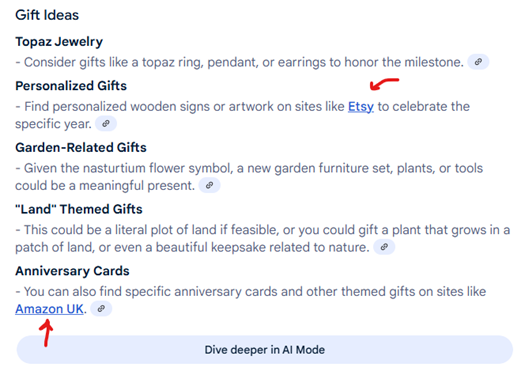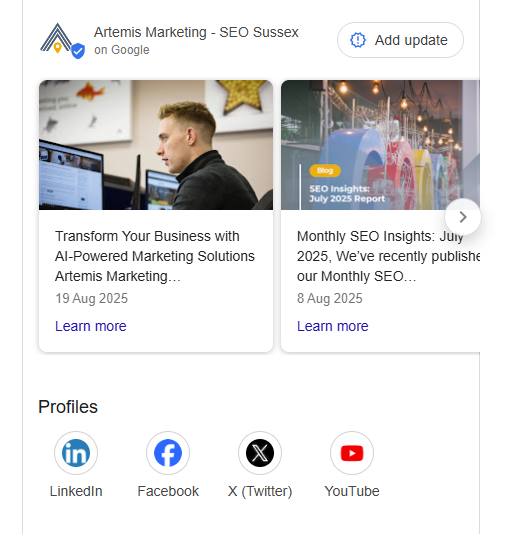Monthly SEO Insights: August
With August came fresh changes, a new Google spam update, AI mode trials and the rising influence of social media. Here are the key highlights from the last month:
Spam Update
Another month, another major update from Google! Yes, Google released a new Spam Update and, at first glance, it appears to have had a profound effect very quickly, even though Google stated that it would take a few weeks to fully roll out.
People, as seen on forums like Webmaster World, have been discussing the significant ranking drops that many websites have suffered as a result of this update.
As to whether any legitimate websites have been caught up in this update, that remains to be seen. Certainly, our own websites and those of our clients haven’t seen any negative effects. Of course, we are constantly staying vigilant as the effects of this update are still being felt.
Google is continually trying to ‘clean up’ its index, and the continued involvement of generative AI features is likely to make this more complicated. As a result, it’s likely that more Spam Updates will continue to be rolled out, and more frequently.
However, if you’re exercising good SEO and producing useful, helpful, and user-focused content, you’re less likely to see your rankings drop. If anything, you’re likely to see improvements.
AI Mode Links
Now that AI Mode officially been rolled out in the UK, we can begin to understand how this feature’s being used, and the effect that it may have on particular search queries (or, in this case, prompts.)
AI Mode is, however, a very new feature, and Google will no doubt improve and change over time, and it’s realistic to assume this will happen monthly or even weekly. One of the most touted “fears” of AI Mode has always been that websites cited in an AI-generated response aren’t always obvious, and that AI Mode wasn’t inherently set up to drive traffic from the tool to other websites. This is the root of much of the criticism that Google has been receiving recently; in essence, they are “breaking the web” by restricting the traffic going to websites.
Consequently, Google has started experimenting by making links more obvious and prominently placed in AI Overviews and in AI Mode responses. For example, in-text links are now appearing like so:

Not all AI Mode results are displaying results in the same way, at least not in UK results that we monitor. However, AI Overviews and AI Mode responses are much more advanced in the US versions, so it’s wise to assume these changes will make their way over to the UK very soon.
In-text links are generally more effective at providing context to the user and are more likely to encourage the user to click through to the website.
We will, of course, monitor the effect that this has, and how it rolls out. However, it’s important to remember that AI results change all the time, so even suggested websites in results are prone to changing very quickly.
Social Media and Search Rankings
Search and social media have historically been viewed as separate disciplines. However, recent trends have suggested that social media is playing a bigger role than ever in shaping how businesses are discovered and trusted online.
While Google has confirmed that likes and shares aren’t explicitly ranking factors, social platforms remain powerful in ways that strongly influence SEO, brand visibility, and even how emerging AI platforms recommend businesses.
In fact, Google’s Gary Illyes recently reiterated that social engagement metrics (likes, shares, and follower counts, etc.) are not part of the Google ranking algorithm. The reason is because Google prefers to rely on signals it can fully control and verify.
Social numbers and metrics can be manipulated and even bought, and not all social media profiles are trustworthy. Therefore, it means Google looks at social presence in different ways, and cannot trust metrics alone for ranking purposes. More followers and likes doesn’t correlate to trustworthiness and value. However, it doesn’t make social unimportant, by any stretch – quite the opposite, in fact.
Here are the key areas where social media now impacts search:
Building brand authority
A consistent presence on LinkedIn, Instagram, Facebook, or YouTube signals to Google and to users that your brand is legitimate and established. Linking your social media accounts directly from your Google Business Profile also helps Google connect those profiles to your brand, strengthening your online identity and authority.

Increasing visibility in search results
Google is beginning to surface more social content directly within search results, which can range from carousels of recent relevant Facebook posts to embedded YouTube video highlights, depending on the search query. This means your social activity isn’t just supporting your website indirectly; it’s now becoming a visible extension of your brand in Google itself.
User behaviour as a ranking signal
Whilst likes and views may not be ranking factors, the actions users take after engaging with your social media do matter. If visitors arrive from social channels and then purchase, enquire, or return to your site, these behaviours send strong positive signals to Google. With tools like Chrome, Google Analytics, and Android devices, Google has multiple ways of seeing and interpreting this engagement, and rewarding it with improved visibility.
Strengthening customer trust
Before engaging with a business, potential customers often check social profiles to see if the brand feels authentic and active. Social presence complements reviews and website content, offering that extra layer of reassurance in the decision-making process.
Driving engaged traffic
Social media can direct relevant visitors to your website, and when those visitors take meaningful actions, whether it’s submitting an enquiry online, making a purchase, or revisiting your site, these behavioural signals send strong indicators to Google that your site provides value.
Boosting visibility in AI-driven search
Social mentions and brand activity are becoming increasingly important when AI tools formulate personalised answers to you. These systems scan across the web to decide which businesses to recommend, and a trusted, consistent social presence helps make your brand more discoverable in AI-generated results.
With all of this in mind, there’s never been a more vital time to focus on your business as a complete brand, and apply relevant changes to gain as much visibility and trust online as possible. It means that looking at SEO and social media as separate is a thing of the past, and instead establishing a uniform approach that considers all channels and touchpoints to deliver value to your audience.
As always, we’re adapting to stay ahead of search trends, including Google’s recent spam update and the rise of AI Mode. Whether you’re looking to strengthen your social strategy to complement your SEO, need support after the spam update, or want to enhance your visibility in AI Mode, reach out to us to discuss how we’re strengthening our clients’ online presence and helping them stay ahead of the curve

